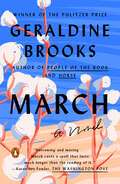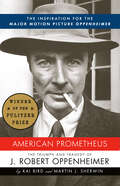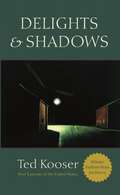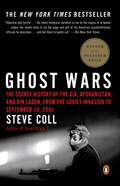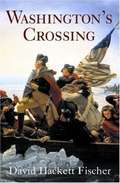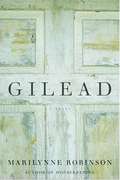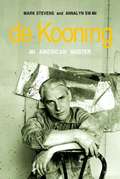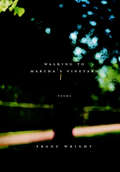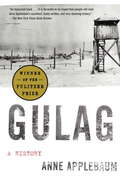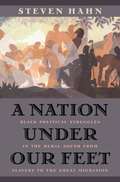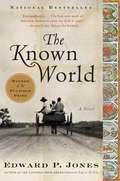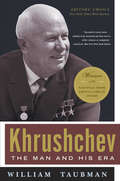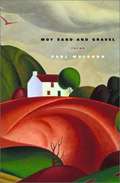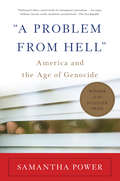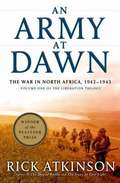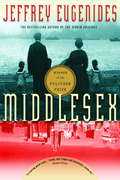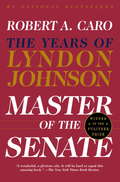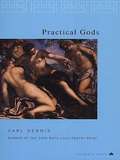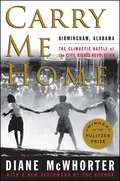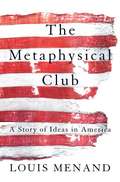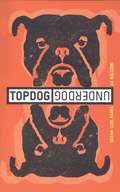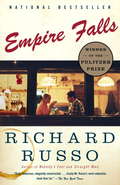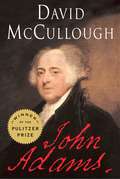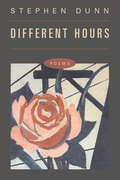Special Collections
Pulitzer Prize Award Winners
Description: Bookshare is pleased to offer the following titles, winners of the Pulitzer Prize Award. Note: Some drama winners are available and are listed under Fiction awards. #award
- Table View
- List View
March
by Geraldine BrooksFrom Louisa May Alcott's beloved classic Little Women, Geraldine Brooks has animated the character of the absent father, March, and crafted a story "filled with the ache of love and marriage and with the power of war upon the mind and heart of one unforgettable man" (Sue Monk Kidd). With "pitch-perfect writing" (USA Today), Brooks follows March as he leaves behind his family to aid the Union cause in the Civil War. His experiences will utterly change his marriage and challenge his most ardently held beliefs.
Pulitzer Prize Winner
American Prometheus
by Kai Bird and Martin J. SherwinTHE INSPIRATION FOR THE MAJOR MOTION PICTURE OPPENHEIMER • "A riveting account of one of history&’s most essential and paradoxical figures.&”—Christopher Nolan#1 NEW YORK TIMES BESTSELLER • PULITZER PRIZE WINNER • The definitive biography of J. Robert Oppenheimer, one of the iconic figures of the twentieth century, a brilliant physicist who led the effort to build the atomic bomb for his country in a time of war, and who later found himself confronting the moral consequences of scientific progress.In this magisterial, acclaimed biography twenty-five years in the making, Kai Bird and Martin Sherwin capture Oppenheimer&’s life and times, from his early career to his central role in the Cold War. This is biography and history at its finest, riveting and deeply informative.&“A masterful account of Oppenheimer&’s rise and fall, set in the context of the turbulent decades of America&’s own transformation. It is a tour de force.&” —Los Angeles Times Book Review&“A work of voluminous scholarship and lucid insight, unifying its multifaceted portrait with a keen grasp of Oppenheimer&’s essential nature.... It succeeds in deeply fathoming his most damaging, self-contradictory behavior.&” —The New York Times
Delights and Shadows
by Ted KooserTed Kooser is a master of metaphor, a poet who deftly connects disparate elements of the world and communicates with absolute precision. Critics call him a “haiku-like imagist” and his poems have been compared to Chekov’s short stories. In Delights and Shadows, Kooser draws inspiration from the overlooked details of daily life. Quotidian objects like a pegboard, creamed corn and a forgotten salesman’s trophy help reveal the remarkable in what before was a merely ordinary world.
Ted Kooser is the author of eight collections of poems and a prose memoir. He lives on a small farm in rural Nebraska.
Pulitzer Prize Winner
Ghost Wars
by Steve CollWinner of the 2005 Pulitzer PrizeThe explosive first-hand account of America's secret history in AfghanistanWith the publication of Ghost Wars, Steve Coll became not only a Pulitzer Prize winner, but also the expert on the rise of the Taliban, the emergence of Bin Laden, and the secret efforts by CIA officers and their agents to capture or kill Bin Laden in Afghanistan after 1998.
Washington's Crossing
by David Hackett FischerSix months after the Declaration of Independence, the American Revolution was all but lost. A powerful British force had routed the Americans at New York, occupied three colonies, and advanced within sight of Philadelphia.
Yet, as David Hackett Fischer recounts in this riveting history, George Washington--and many other Americans--refused to let the Revolution die. On Christmas night, as a howling nor'easter struck the Delaware Valley, he led his men across the river and attacked the exhausted Hessian garrison at Trenton, killing or capturing nearly a thousand men. A second battle of Trenton followed within days. The Americans held off a counterattack by Lord Cornwallis's best troops, then were almost trapped by the British force. Under cover of night, Washington's men stole behind the enemy and struck them again, defeating a brigade at Princeton. The British were badly shaken. In twelve weeks of winter fighting, their army suffered severe damage, their hold on New Jersey was broken, and their strategy was ruined.
Fischer's richly textured narrative reveals the crucial role of contingency in these events. We see how the campaign unfolded in a sequence of difficult choices by many actors, from generals to civilians, on both sides. While British and German forces remained rigid and hierarchical, Americans evolved an open and flexible system that was fundamental to their success. The startling success of Washington and his compatriots not only saved the faltering American Revolution, but helped to give it new meaning.
Pulitzer Prize Winner
Gilead
by Marilynne RobinsonIn 1956, toward the end of Reverend John Ames's life, he begins a letter to his young son, an account of himself and his forebears. Ames is the son of an Iowan preacher and the grandson of a minister who, as a young man in Maine, saw a vision of Christ bound in chains and came west to Kansas to fight for abolition: He "preached men into the Civil War," then, at age fifty, became a chaplain in the Union Army, losing his right eye in battle.
Reverend Ames writes to his son about the tension between his father--an ardent pacifist--and his grandfather, whose pistol and bloody shirts, concealed in an army blanket, may be relics from the fight between the abolitionists and those settlers who wanted to vote Kansas into the union as a slave state. And he tells a story of the sacred bonds between fathers and sons, which are tested in his tender and strained relationship with his namesake, John Ames Boughton, his best friend's wayward son.
This is also the tale of another remarkable vision--not a corporeal vision of God but the vision of life as a wondrously strange creation. It tells how wisdom was forged in Ames's soul during his solitary life, and how history lives through generations, pervasively present even when betrayed and forgotten.
Pulitzer Prize Winner
De Kooning
by Mark Stevens and Annalyn SwanWillem de Kooning is one of the most important artists of the twentieth century, a true “painter’s painter” whose protean work continues to inspire many artists. In the thirties and forties, along with Arshile Gorky and Jackson Pollock, he became a key figure in the revolutionary American movement of abstract expressionism. Of all the painters in that group, he worked the longest and was the most prolific, creating powerful, startling images well into the 1980s. The first major biography of de Kooning captures both the life and work of this complex, romantic figure in American culture. Ten years in the making, and based on previously unseen letters and documents as well as on hundreds of interviews, this is a fresh, richly detailed, and masterful portrait. The young de Kooning overcame an unstable, impoverished, and often violent early family life to enter the Academie in Rotterdam, where he learned both classic art and guild techniques. Arriving in New York as a stowaway from Holland in 1926, he underwent a long struggle to become a painter and an American, developing a passionate friendship with his fellow immigrant Arshile Gorky, who was both a mentor and an inspiration. During the Depression, de Kooning emerged as a central figure in the bohemian world of downtown New York, surviving by doing commercial work and painting murals for the WPA. His first show at the Egan Gallery in 1948 was a revelation. Soon, the critics Harold Rosenberg and Thomas Hess were championing his work, and de Kooning took his place as the charismatic leader of the New York school—just as American art began to dominate the international scene.
Dashingly handsome and treated like a movie star on the streets of downtown New York, de Kooning had a tumultuous marriage to Elaine de Kooning, herself a fascinating character of the period. At the height of his fame, he spent his days painting powerful abstractions and intense, disturbing pictures of the female figure—and his nights living on the edge, drinking, womanizing, and talking at the Cedar bar with such friends as Franz Kline and Frank O’Hara. By the 1960s, exhausted by the feverish art world, he retreated to the Springs on Long Island, where he painted an extraordinary series of lush pastorals. In the 1980s, as he slowly declined into what was almost certainly Alzheimer’s, he created a vast body of haunting and ethereal late work.
This is an authoritative and brilliant exploration of the art, life, and world of an American master.
Pulitzer Prize Winner
Walking to Martha's Vineyard
by Franz WrightIn this radiant new collection, Franz Wright shares his regard for life in all its forms and his belief in the promise of blessing and renewal. As he watches the “Resurrection of the little apple tree outside / my window,” he shakes off his fear of mortality, concluding “what death . . . There is only / mine / or yours,– / but the world / will be filled with the living. ” In prayerlike poems he invokes the one “who spoke the world / into being” and celebrates a dazzling universe–snowflakes descending at nightfall, the intense yellow petals of the September sunflower, the planet adrift in a blizzard of stars, the simple mystery of loving other people. As Wright overcomes a natural tendency toward loneliness and isolation, he gives voice to his hope for “the only animal that commits suicide,” and, to our deep pleasure, he arrives at a place of gratitude that is grounded in the earth and its moods.
Gulag
by Anne ApplebaumThe Gulag--the vast array of Soviet concentration camps--was a system of repression and punishment whose rationalized evil and institutionalized inhumanity were rivaled only by the Holocaust. The Gulag entered the world's historical consciousness in 1972, with the publication of Alexander Solzhenitsyn's epic oral history of the Soviet camps, The Gulag Archipelago. Since the collapse of the Soviet Union, dozens of memoirs and new studies covering aspects of that system have been published in Russia and the West. Using these new resources as well as her own original historical research, Anne Applebaum has now undertaken, for the first time, a fully documented history of the Soviet camp system, from its origins in the Russian Revolution to its collapse in the era of glasnost. It is an epic feat of investigation and moral reckoning that places the Gulag where it belongs: at the center of our understanding of the troubled history of the twentieth century. Anne Applebaum first lays out the chronological history of the camps and the logic behind their creation, enlargement, and maintenance. The Gulag was first put in place in 1918 after the Russian Revolution. In 1929, Stalin personally decided to expand the camp system, both to use forced labor to accelerate Soviet industrialization and to exploit the natural resources of the country's barely habitable far northern regions. By the end of the 1930s, labor camps could be found in all twelve of the Soviet Union's time zones. The system continued to expand throughout the war years, reaching its height only in the early 1950s. From 1929 until the death of Stalin in 1953, some 18 million people passed through this massive system. Of these 18 million, it is estimated that 4.5 million never returned. But the Gulag was not just an economic institution. It also became, over time, a country within a country, almost a separate civilization, with its own laws, customs, literature, folklore, slang, and morality. Topic by topic, Anne Applebaum also examines how life was lived within this shadow country: how prisoners worked, how they ate, where they lived, how they died, how they survived. She examines their guards and their jailers, the horrors of transportation in empty cattle cars, the strange nature of Soviet arrests and trials, the impact of World War II, the relations between different national and religious groups, and the escapes, as well as the extraordinary rebellions that took place in the 1950s. She concludes by examining the disturbing question why the Gulag has remained relatively obscure, in the historical memory of both the former Soviet Union and the West. Gulag: A History will immediately be recognized as a landmark work of historical scholarship and an indelible contribution to the complex, ongoing, necessary quest for truth.
Pulitzer Prize Winner
A Nation under Our Feet
by Steven HahnThis is the epic story of how African-Americans, in the six decades after their release from slavery, transformed themselves into a political people- an embryonic black nation.
Pulitzer Prize Winner
The Known World
by Edward JonesThe Known World tells the story of Henry Townsend, a black farmer and former slave who falls under the tutelage of William Robbins, the most powerful man in Manchester County, Virginia. Making certain he never circumvents the law, Townsend runs his affairs with unusual discipline. But when death takes him unexpectedly, his widow, Caldonia, can't uphold the estate's order, and chaos ensues. Jones has woven a footnote of history into an epic that takes an unflinching look at slavery in all its moral complexities.
Winner of the 2004 Pulitzer Prize for fiction and the 2003 National Book Critics Circle Award for Fiction. Finalist for the 2003 National Book Award for Fiction.
Khrushchev
by William TaubmanThe definitive biography of the mercurial Soviet leader who succeeded and denounced Stalin. Nikita Khrushchev was one of the most complex and important political figures of the twentieth century. Ruler of the Soviet Union during the first decade after Stalin's death, Khrushchev left a contradictory stamp on his country and on the world. His life and career mirror the Soviet experience: revolution, civil war, famine, collectivization, industrialization, terror, world war, cold war, Stalinism, post-Stalinism. Complicit in terrible Stalinist crimes, Khrushchev nevertheless retained his humanity: his daring attempt to reform communism prepared the ground for its eventual collapse; and his awkward efforts to ease the cold war triggered its most dangerous crises.
This is the first comprehensive biography of Khrushchev and the first of any Soviet leader to reflect the full range of sources that have become available since the USSR collapsed. Combining a page-turning historical narrative with penetrating political and psychological analysis, this book brims with the life and excitement of a man whose story personified his era.
Pulitzer Prize Winner
Moy Sand and Gravel
by Paul MuldoonPaul Muldoon's ninth collection of poems, his first since 1998, finds him working a rich vein that extends from the rivery, apple-heavy County Armagh of the 1950s, in which he was brought up, to suburban New Jersey, on the banks of a canal dug by Irish navvies, where he now lives. Grounded, glistening, as gritty as they are graceful, these poems seem capable of taking in almost anything, and anybody, be it a Tuareg glimpsed on the Irish border, Bessie Smith, Marilyn Monroe, Queen Elizabeth I, a hunted hare, William Tell, William Butler Yeats, Sitting Bull, Ted Hughes, an otter, a fox, Mr. and Mrs. Stanley Joscelyne, an unearthed pit pony, a loaf of bread, an outhouse, a killdeer, Oscar Wilde, or a flock of redknots. At the heart of the book is an elegy for a miscarried child, and that elegiac tone predominates, particularly in the elegant remaking of Yeats's "A Prayer for My Daughter" with which the book concludes, where a welter of traffic signs and slogans, along with the spirits of admen, hardware storekeepers, flimflammers, fixers, and other forebears, are borne along by a hurricane-swollen canal, and private grief coincides with some of the gravest matter of our age.
Pulitzer Prize for Poetry 2003.
A Problem From Hell
by Samantha PowerIn 1993, as a 23-year-old correspondent covering the wars in the Balkans, I was initially comforted by the roar of NATO planes flying overhead.
President Clinton and other western leaders had sent the planes to monitor the Bosnian war, which had killed almost 200,000 civilians. But it soon became clear that NATO was unwilling to target those engaged in brutal "ethnic cleansing. " American statesmen described Bosnia as "a problem from hell," and for three and a half years refused to invest the diplomatic and military capital needed to stop the murder of innocents.
In Rwanda, around the same time, some 800,000 Tutsi and opposition Hutu were exterminated in the swiftest killing spree of the twentieth century. Again, the United States failed to intervene. This time U. S. policy-makers avoided labeling events "genocide" and spearheaded the withdrawal of UN peacekeepers stationed in Rwanda who might have stopped the massacres underway.
Whatever America's commitment to Holocaust remembrance (embodied in the presence of the Holocaust Museum on the Mall in Washington, D. C. ), the United States has never intervened to stop genocide. This book is an effort to understand why.
While the history of America's response to genocide is not an uplifting one, "A Problem from Hell" tells the stories of countless Americans who took seriously the slogan of "never again" and tried to secure American intervention. Only by understanding the reasons for their small successes and colossal failures can we understand what we as a country, and we as citizens, could have done to stop the most savage crimes of the last century. -Samantha
Pulitzer Prize Winner
An Army at Dawn
by Rick AtkinsonThe liberation of Europe and the destruction of the Third Reich is a story of courage and enduring triumph, of calamity and miscalculation. In this first volume of the Liberation Trilogy, Rick Atkinson shows why no modern reader can understand the ultimate victory of the Allied powers without a grasp of the great drama that unfolded in North Africa in 1942 and 1943. That first year of the Allied war was a pivotal point in American history, the moment when the United States began to act like a great power.
Beginning with the daring amphibious invasion in November 1942, An Army at Dawn follows the American and British armies as they fight the French in Morocco and Algeria, and then take on the Germans and Italians in Tunisia. Battle by battle, an inexperienced and sometimes poorly led army gradually becomes a superb fighting force. Central to the tale are the extraordinary but fallible commanders who come to dominate the battlefield: Eisenhower, Patton, Bradley, Montgomery, and Rommel.
Brilliantly researched, rich with new material and vivid insights, Atkinson's narrative provides the definitive history of the war in North Africa.
Pulitzer Prize Winner
Middlesex
by Jeffrey EugenidesSpanning eight decades and chronicling the wild ride of a Greek-American family through the vicissitudes of the twentieth century, Jeffrey Eugenides' witty, exuberant novel on one level tells a traditional story about three generations of a fantastic, absurd, lovable immigrant family -- blessed and cursed with generous doses of tragedy and high comedy.But there's a provocative twist. Cal, the narrator -- also Callie -- is a hermaphrodite. And the explanation for this takes us spooling back in time, through a breathtaking review of the twentieth century, to 1922, when the Turks sacked Smyrna and Callie's grandparents fled for their lives. Back to a tiny village in Asia Minor where two lovers, and one rare genetic mutation, set our narrator's life in motion.Middlesex is a grand, utterly original fable of crossed bloodlines, the intricacies of gender, and the deep, untidy promptings of desire. It's a brilliant exploration of divided people, divided families, divided cities and nations -- the connected halves that make up ourselves and our world. Justly acclaimed when it was released in Fall 2002, it announces the arrival of a major writer for our times.From the Hardcover edition.
Anna in the Tropics
by Nilo CruzWinner of the 2003 Pulitizer Prize for Drama. . . there are many kinds of light.The light of fires. The light of stars.The light that reflects off rivers.Light that penetrates through cracks.Then there's the type of light that reflects off the skin.--Nilo Cruz, Anna in the TropicsThis lush romantic drama depicts a family of cigar makers whose loves and lives are played out against the backdrop of America in the midst of the Depression. Set in Ybor City (Tampa) in 1930, Cruz imagines the catalytic effect the arrival of a new "lector" (who reads Tolstoy's Anna Karenina to the workers as they toil in the cigar factory) has on a Cuban-American family. Cruz celebrates the search for identity in a new land."The words of Nilo Cruz waft from the stage like a scented breeze. They sparkle and prickle and swirl, enveloping those who listen in both specific place and time . . . and in timeless passions that touch us all. In Anna in the Tropics, the world premiere work he created for Coral Gables' intimate New Theatre, Cruz claims his place as a storyteller of intricate craftsmanship and poetic power."--Miami HeraldNilo Cruz is a young Cuban-American playwright whose work has been produced widely around the United States including the Public Theater (New York, NY), South Coast Repertory (Costa Mesa, CA), Magic Theatre (San Francisco, CA), Oregon Shakespeare Festival, McCarter Theater (Princeton, NJ) and New Theatre (Coral Gables, FL). His other plays include Night Train to Bolina, Two Sisters and a Piano, Hortensia and the Museum of Dreams, among others. Anna in the Tropics also won the Steinberg Award for Best New Play. Mr. Cruz teaches playwriting at Yale University and lives in New York City.
Master of the Senate
by Robert A. CaroThe most riveting political biography of our time, Robert A. Caro's life of Lyndon B. Johnson, continues. Master of the Senate takes Johnson's story through one of its most remarkable periods: his twelve years, from 1949 through 1960, in the United States Senate. Once the most august and revered body in politics, by the time Johnson arrived the Senate had become a parody of itself and an obstacle that for decades had blocked desperately needed liberal legislation. Caro shows how Johnson's brilliance, charm, and ruthlessness enabled him to become the youngest and most powerful Majority Leader in history and how he used his incomparable legislative genius--seducing both Northern liberals and Southern conservatives--to pass the first Civil Rights legislation since Reconstruction. Brilliantly weaving rich detail into a gripping narrative, Caro gives us both a galvanizing portrait of Johnson himself and a definitive and revelatory study of the workings of legislative power.
Winner of the National Book Award
Winner of the Pulitzer Prize
Practical Gods
by Carl DennisWinner of the 2001 Pulitzer Prize for Poetry. Practical Gods is the eighth collection by Carl Dennis, a critically acclaimed poet and recent winner of one of the most prestigious poetry awards, the Ruth Lilly Prize. Carl Dennis has won acclaim for "wise, original, and often deeply moving" poems that "ease the reader out of accustomed modes of seeing and perceiving" (The New York Times). Many of the poems in this new book involve an attempt to enter into dialogue with pagan and biblical perspectives, to throw light on ordinary experience through metaphor borrowed from religious myth and to translate religious myth into secular terms. While making no claims to put us in touch with some ultimate reality, these clear, precise, sensitive poems help us to pay homage to the everyday household gods that are easy to ignore, the gods that sustain life and make it rewarding. .
Carry Me Home
by Diane McwhorterNow with a new afterword, the Pulitzer Prize-winning dramatic account of the civil rights era’s climactic battle in Birmingham as the movement, led by Martin Luther King, Jr., brought down the institutions of segregation."The Year of Birmingham," 1963, was a cataclysmic turning point in America’s long civil rights struggle. Child demonstrators faced down police dogs and fire hoses in huge nonviolent marches against segregation. Ku Klux Klansmen retaliated by bombing the Sixteenth Street Baptist Church, killing four young black girls. Diane McWhorter, daughter of a prominent Birmingham family, weaves together police and FBI records, archival documents, interviews with black activists and Klansmen, and personal memories into an extraordinary narrative of the personalities and events that brought about America’s second emancipation. In a new afterword—reporting last encounters with hero Reverend Fred Shuttlesworth and describing the current drastic anti-immigration laws in Alabama—the author demonstrates that Alabama remains a civil rights crucible.
The Metaphysical Club
by Louis MenandWinner of the 2002 Pulitzer Prize for History, a riveting, original book about the creation of modern American thought. The Metaphysical Club was an informal group that met in Cambridge, Massachusetts, in 1872, to talk about ideas. Its members included Oliver Wendell Holmes, Jr., future associate justice of the United States Supreme Court; William James, the father of modern American psychology; and Charles Sanders Peirce, logician, scientist, and the founder of semiotics. The Club was probably in existence for about nine months. No records were kept. The one thing we know that came out of it was an idea -- an idea about ideas.
Topdog/Underdog
by Suzan-Lori ParksA darkly comic fable of brotherly love and family identity is Suzan-Lori Parks latest riff on the way we are defined by history. The play tells the story of Lincoln and Booth, two brothers whose names were given to them as a joke, foretelling a lifetime of sibling rivalry and resentment. Haunted by the past, the brothers are forced to confront the shattering reality of their future.Suzan-Lori Parks is the author of numerous plays, including In the Blood and Venus. She is currently head of the A.S.K. Theater Projects Writing for Performance Program at the California Institute of the Arts in Valencia.
Empire Falls
by Richard RussoRichard Russo--from his first novel, Mohawk, to his most recent, Straight Man--has demonstrated a peerless affinity for the human tragicomedy, and with this stunning new novel he extends even further his claims on the small-town, blue-collar heart of the country.
Dexter County, Maine, and specifically the town of Empire Falls, has seen better days, and for decades, in fact, only a succession from bad to worse. One by one, its logging and textile enterprises have gone belly-up, and the once vast holdings of the Whiting clan (presided over by the last scion's widow) now mostly amount to decrepit real estate. The working classes, meanwhile, continue to eke out whatever meager promise isn't already boarded up.
Miles Roby gazes over this ruined kingdom from the Empire Grill, an opportunity of his youth that has become the albatross of his daily and future life. Called back from college and set to work by family obligations--his mother ailing, his father a loose cannon--Miles never left home again. Even so, his own obligations are manifold: a pending divorce; a troubled younger brother; and, not least, a peculiar partnership in the failing grill with none other than Mrs. Whiting. All of these, though, are offset by his daughter, Tick, whom he guides gently and proudly through the tribulations of adolescence.
A decent man encircled by history and dreams, by echoing churches and abandoned mills, by the comforts and feuds provided by lifelong friends and neighbors, Miles is also a patient, knowing guide to the rich, hardscrabble nature of Empire Falls: fathers and sons and daughters, living and dead, rich and poor alike. Shot through with the mysteries of generations and the shattering visitations of the nation at large, it is a social novel of panoramic ambition, yet at the same time achingly personal. In the end, Empire Falls reveals our worst and best instincts, both our most appalling nightmares and our simplest hopes, with all the vision, grace and humanity of truly epic storytelling.
Winner of the Pulitzer Prize (2002-Fiction)
John Adams
by David McculloughIn this powerful, epic biography, David McCullough unfolds the adventurous life journey of John Adams, the brilliant, fiercely independent, often irascible, always honest Yankee patriot who spared nothing in his zeal for the American Revolution; who rose to become the second president of the United States and saved the country from blundering into an unnecessary war; who was learned beyond all but a few and regarded by some as “out of his senses”; and whose marriage to the wise and valiant Abigail Adams is one of the moving love stories in American history.
This is history on a grand scale—a book about politics and war and social issues, but also about human nature, love, religious faith, virtue, ambition, friendship, and betrayal, and the far-reaching consequences of noble ideas. Above all, John Adams is an enthralling, often surprising story of one of the most important and fascinating Americans who ever lived.
Pulitzer Prize Winner
Different Hours
by Stephen DunnA wise and graceful new collection by one of our "major, indispensable poets" (Sidney Lea). The mysteries of Eros and Thanatos, the stubborn endurance of mind and body in the face of diminishment--these are the undercurrents of Stephen Dunn's eleventh volume. "I am interested in exploring the 'different' hours," he says, "not only of one's life, but also of the larger historical and philosophical life beyond the personal."
Winner of the 2001 Pulitzer Prize for Poetry.
